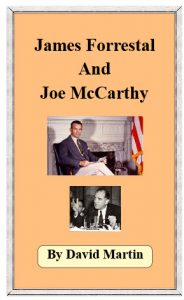IN THE MIDDLE OF THE 20TH CENTURY the two most important anti-Communists in the United States government were Secretary of the Navy and later Secretary of Defence, James V. Forrestal, and Wisconsin Senator Joseph R. McCarthy. But they had a great deal more in common than that. The following passage is from pages 147-148 of the 1966 book, The Death of James Forrestal, written anonymously by someone using the pen name, Cornell Simpson:*
There were extraordinary parallels in the lives and deaths of McCarthy and Forrestal—two Irish-Catholic Americans who both rose by their bootstraps to high office in Washington, D.C., and who successively spearheaded the fight against the worldwide Communist conspiracy. Each man was the victim of smear attacks that rose to a pitch of vituperation and vileness previously unmatched in this century. Each man was pathologically hated by every left-winger and subversive in America. Each man died at a most “convenient” and strategic time. And each death beyond doubt altered the course of history.
Appropriately, it was Forrestal who personally alerted freshman Senator McCarthy to the Communist menace and “named names” to him of key persons in our federal government who were consistently shaping our policies and programs to benefit Soviet Russia. It was Forrestal who thus directly inspired McCarthy’s subsequent exposés of Communist influence and subversion in the federal government.
After Forrestal met his violent end, McCarthy moved up to the front lines. And when McCarthy began publicly exposing Communists in the State Department, the Communist party at once openly proclaimed in the Daily Worker and elsewhere that McCarthy was now the Communists’ main enemy. The Daily Worker also called on all Communists and left-wing elements to unite in and give top priority to the fight against “McCarthyism.”
For years, McCarthy continued his important work of investigating and unmasking individual Communists infiltrated into department after department of our federal government—and of exposing and opposing many of the executive department’s foreign and domestic policies. He also wrote two well-documented anti-Communist books. He had two more such books in the works when he died.
James Forrestal and Joe McCarthy
James Forrestal and Joe McCarthy
842 Downloads
